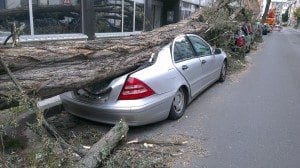Roadway Accidents: Understanding the Government’s Liability
July 27, 2016 @ 9:23 am

Every driver is responsible for being safe on the road. However, what happens when the road is not safe for drivers? Some traffic accidents are not caused by driver error. Instead, you may find yourself in a wreck caused by damaged roads or malfunctioning traffic equipment. When this occurs, who is responsible for your expenses? When determining the government’s liability, there are several critical factors we have to consider:
1. Roadway Responsibilities
On public roads, the government often has a responsibility to conduct proper maintenance. This may include the road itself as well as any signs, lights or traffic signals. Therefore, the government can be liable if accidents occur due to potholes, shoulder drop-offs, missing signs and faulty traffic lights. This responsibility may extend to providing support during bad weather conditions. Construction zones are also under governmental purview. This means that if the accident stems from poor upkeep in any of those areas, the government could potentially be held liable. Of course, accidents can lead to personal injury, or damage to the vehicle, or both.
2. Time and Awareness
While the government is often responsible for road maintenance, you are not guaranteed a payout by bringing a claim against the government. Instead, keep in mind that any given city or township has reasonable margins when it comes to road maintenance. When a roadway becomes hazardous or damaged, city officials require a reasonable amount of time to organize and complete road upkeep. For example, officials may allow road crews up to a day to remove snow or ice. During this time, public announcements may be released to warn residents of the hazard.
Moreover, the government may not be liable if the government has no knowledge of a problem. While routine commissions of roadway inspections occur, it is impractical to assume city officials are aware of all problems at all times. If no one has alerted the proper channels of a particular road issue, if may be difficult to meet all the elements of a claim against the government for the hazard.
3. Proof of Incident
If you have been injured or had your car damaged due to poor road conditions, it will be your burden to prove that the government bears responsibility. This often requires more than your own testimony. This is why you should document as much as you can about the incident. Write down exactly where and how the accident occurred. If possible, take pictures of the exact road conditions. You can also request road surveys to see if problems have been noted in the past. Talk to people who live in the area or who drive the road frequently. If you can find evidence of consistent problems, then you have a better chance of substantiating your claim.
4. Take Action
Even with these guidelines, it can be difficult to decide whether or not to pursue legal action. The best way to proceed is to talk to an experienced personal injury attorney. At Morrow, Morrow, Ryan, Bassett & Haik, our team has been working since 1975 to help residents in the community of St. Landry Parish get the legal support they deserve. In personal injury cases, Morrow, Morrow, Ryan, Bassett & Haik can help ascertain the viability of a lawsuit.
